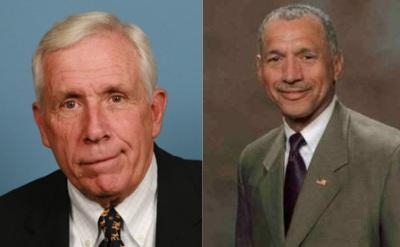Wolf: Goal Is Not Creation Of A Commercial Space Industry
Rep. Frank Wolf (R-VA) (pictured, left), chairman of the House Commerce-Justice-Science Appropriations subcommittee, said Tuesday he had reached an agreement with NASA Administrator Charles Bolden (pictured, right) regarding the future of the commercial crew program.

Wolf said the country needs an exceptional program to return American astronauts to the moon, and ultimately beyond. Space, he said, is the ultimate ‘high ground’ for a nation and will play an increasingly critical role in our national security and economic growth in the 21st Century.
"Given recent advances in space capabilities by foreign competitors, it is essential that the U.S. move quickly to restore its domestic crew access to the International Space Station (ISS) and focus on the successful completion of our unique exploration systems, including the Space Launch System and Orion crew vehicle," Wolf said in a statement. "During this current “gap” in U.S. access to both low earth orbit and beyond, it is imperative that NASA focus its limited resources on these critical human spaceflight missions.
"For these reasons, I have had serious concerns about NASA’s management of the commercial crew program over the last two years. That is why I included language in the report accompanying the fiscal year 2013 Commerce-Justice-Science Appropriations bill, H.R. 5326, to address these concerns and direct a new management paradigm for the program. I remain convinced that the approach outlined in the committee’s report is the most appropriate way forward for the program.
"However, in an effort to prevent any disruption in the development of crew vehicles to return U.S. astronauts to ISS as quickly as possible, I have reached an understanding with NASA Administrator Bolden in an exchange of letters that will allow the upcoming Commercial Crew Integrated Capability (CCiCAP) phase to proceed under a revised, more limited management roadmap and with an fiscal year 2013 funding level at or near the Senate Appropriations Committee-approved amount. As part of this understanding, NASA and the committee have affirmed that the primary objective of the commercial crew program is achieving the fastest, safest and most cost-effective means of domestic access to the ISS, not the creation of a commercial crew industry."
Wolf said NASA agreed to reduce the number of awards anticipated to be made this summer from the 4 awards made under commercial crew development round 2 to not more than 2.5 (two full and one partial) CCiCAP awards. He said the change would reduce taxpayer exposure by "concentrating funds on those participants who are most likely to be chosen to eventually provide service to ISS."
NASA also has stated that, after the CCiCAP phase, future program funding will only come in the form of FAR-based certification and service contracts. Further, to help prevent a problematic logistical “choke point” at the beginning of the certification phase, NASA will also produce an important new procurement strategy for awarding these FAR-based contracts, which will be substantively complete prior to the awarding of CCiCAP funds.
The Congressman said NASA assured him that it will carefully examine commercial crew participants’ financial health and viability before providing CCiCAP funds, and ensure the government's “first right of refusal” to acquire property developed under or acquired as part of the commercial crew program at a price that reflects the taxpayers’ existing investment in its development.
"Should any of NASA’s plans and intentions change from what was agreed to in the exchange of letters, I will reevaluate the situation," Wolf said. "I will continue to follow up with NASA to monitor the implementation of these understandings in fiscal year 2012 – both through committee actions and through appropriate outside oversight – and to ensure that these principles are reflected in any final appropriations legislation for fiscal year 2013."

Senator Kay Bailey Hutchison (pictured), the senior Republican on the Senate Committee on Commerce, Science and Transportation and Ranking Member of the Appropriations Subcommittee on Commerce, Justice and Science, praised the announcement made by Representative Wolf.
“I had previously called for NASA to down-select from four potential commercial providers to the top two firms. Today’s announcement follows that prescription and is welcome news.
“This is an important turning point that should keep development of commercial crew capability on schedule and on budget, and assure that NASA will also have the financial and human resources it needs to move forward with developing heavy launch capabilities for deep space exploration.
“We should have two goals: To ensure full manned access to the space station that utilizes the investment made in that unique microgravity laboratory and to reach our nation’s next horizon in space exploration beyond low earth orbit. Both of these goals can be achieved if we invest taxpayer dollars wisely and take advantage of the years of invaluable experience developed within NASA."
 ANN's Daily Aero-Linx (04.13.24)
ANN's Daily Aero-Linx (04.13.24) ANN's Daily Aero-Term (04.13.24): Beyond Visual Line Of Sight (BVLOS)
ANN's Daily Aero-Term (04.13.24): Beyond Visual Line Of Sight (BVLOS) Airborne 04.09.24: SnF24!, Piper-DeltaHawk!, Fisher Update, Junkers
Airborne 04.09.24: SnF24!, Piper-DeltaHawk!, Fisher Update, Junkers Aero-News: Quote of the Day (04.14.24)
Aero-News: Quote of the Day (04.14.24) ANN's Daily Aero-Term (04.14.24): Maximum Authorized Altitude
ANN's Daily Aero-Term (04.14.24): Maximum Authorized Altitude




